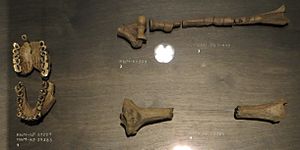Australopithecus anamensis facts for kids
Quick facts for kids Australopithecus anamensisTemporal range: Pliocene
|
|
|---|---|
 |
|
| Fossils | |
| Scientific classification | |
| Kingdom: | |
| Phylum: | |
| Class: | |
| Order: | |
| Family: | |
| Subfamily: | |
| Genus: | |
| Binomial name | |
| Australopithecus anamensis Leakey et al., 1995
|
|
Australopithecus anamensis is an ancient human ancestor. It belongs to the group of early humans called Australopithecus. Scientists found its first fossils in East Lake Turkana in 1965. These fossils were about four million years old. More discoveries happened later, helping us learn more about this species.
Contents
Discovering Australopithecus anamensis
The first fossil of A. anamensis was an arm bone. A Harvard University team found it in 1965. This discovery was made near Lake Turkana in Kenya. At first, scientists weren't sure what species it was. They thought it was an Australopithecus.
More clues appeared in 1987. An archaeologist named Allan Morton found more fragments. He found them near Allia Bay, also in Kenya. These new pieces were sticking out of a hillside.
Important Finds by Meave Leakey
Six years later, in 1993, more exciting finds happened. Meave Leakey, a paleoanthropologist, and Alan Walker, an archaeologist, dug at the Allia Bay site. They found many more parts of this ancient human.
One very important find was a complete lower jaw bone. This jaw looked a lot like a chimpanzee's jaw. But the teeth were much more like a human's teeth. This mix of features was very interesting to scientists.
Naming the New Species
In 1995, Meave Leakey and her team studied all the fossils. They noticed that these new finds were different from Australopithecus afarensis. A. afarensis is another well-known early human species.
Because of these differences, they decided it was a new species. They named it A. anamensis. The name comes from the Turkana word "anam." This word means "lake," referring to where the fossils were found.
Images for kids
See also
 In Spanish: Australopithecus anamensis para niños
In Spanish: Australopithecus anamensis para niños
 | Ernest Everett Just |
 | Mary Jackson |
 | Emmett Chappelle |
 | Marie Maynard Daly |



